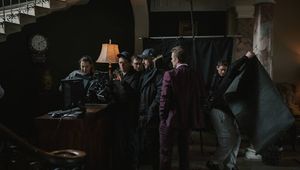
Escaping Creative Straitjackets

Photo by aboodi vesakaran on Unsplash
Anyone who has worked to establish themselves within the creative industry will know a thing or two about working towards a niche. Finding your groove in a particular area and then carving out a creative signature. It works wonders for defining then harnessing your skillset, and creating that all important name for yourself. But what happens when you find yourself backed into a corner that you’ve comfortably created? You may look up one day to find yourself fastened into a creative straitjacket of your own making.
It’s a story many creative folks are acquainted with, and it was no different for Banjoman director, Dermot Malone. Dermot has had a brilliant career that’s gone from strength to strength over the years, propelled by his ability to tell deep, meaningful, and often emotional stories. When he was approached to direct a campaign for comedy, it didn't come without hesitation. We spoke to Dermot to find out about the journey of unboxing himself, and experiencing a creative metamorphosis along the way.
"What if this f*cks everything up?"
Dermot says when he first got the call asking him to direct the campaign for Strong Roots, his biggest worry was about eroding his reputation as an emotional storyteller. “I genuinely thought for a second, ‘If I do this am I going to ruin things?’. That’s both scary and exciting all at once. But ultimately some of the great filmmakers that I love and admire, dip their toe into all manner of genre,” says Dermot. He wanted to show that filmmaking as a craft transcends these man-made borders. “If I were to happily live in a pigeonhole, I’d call myself a performance director,” he explains. “So this piece, albeit happy, comedic and light, is still centred around performance.”
The approach to directing the comedy spot was interestingly similar to that of the more meaning-dense projects that Dermot has been accustomed to. “My process didn’t really change at all. When working with actors, it’s always about having a conversation with them, focusing on understanding, and making sure we all know where we stand. Then it’s just about trusting one-another to try things and creating a space where the actors feel comfortable to explore. That goes for meaning-heavy projects as much as it does comedy. The only difference being that with the latter, it’s more immediately fun,” Dermot tells us.
In terms of the language of the camera though, Dermot admits that was a first. He says you must use the camera to lean into the genre, which will include things like different pans, and interesting pushes and pulls that he wouldn’t typically use in emotive pieces. “The output changed but the process remained the same; it’s all about respecting the cameras and the actors in a massive way.”
It's easier to get a tear than a laugh
The big question on set was considering whether the lines on the script which read to be funny would do the same thing when brought to life in a 3D format. “That’s very different from drama and emotive storytelling,” says Dermot. “Typically, what would work on the page there, will work in a scene. But in comedy, it can read okay and then fall flat. That’s when you need to be able to ask ‘what do we change?’ That again comes back to having confidence in yourself, the device, and your actors. You can then begin to workshop in the moment.” Dermot says the spot was filled with plenty of improvisation. It seems that many of the challenges that arise can be put back to bed if you work with trust.
When it comes to Dermot's perspective, he reckons the experience brought about a massive shift. “I now have a perspective on being able to approach different projects and something physical to show a different muscle,” he explains. While it’s unlikely Dermot will become a full time comedy director, he’s delighted at having been able to step out and experience craft and performance from a new angle. “The new perspective I have is that it’s probably harder to get a laugh than it is to make someone feel something; or at least the feeling part comes more naturally to me,” he says.
The golden marriage
Comedy as a genre is renowned for being beholden to the golden marriage of timing and tone. Dermot knew from the outset that that would be the case. Luckily the tone was nicely set by the world they built, the music, and the production design. It all came down to the timing. “The funny thing you notice is that with comedy, you know immediately on set whether it’s going to land or not. With drama you’re left wondering how it’ll be received within the context of the larger scene,” Dermot tells us.
Within the film there is a talking head sequence which makes it feel almost mockumentary, as well as the observation of two karma technicians in the flow of their world. “That’s kind of like having two languages,” says Dermot. “The talking head completely breaks the fourth wall, and then you have this observational sequence. It’s as if they are fighting each other. That was definitely a consideration.” Dermot says that usually the modes of stories he tells are linear, so it took a bit of adapting.
Boxes
For Dermot, he believes that there is a differentiation between being boxed-in, and being happily boxed-in. “There are comedy directors, storytelling directors, documentary directors who nine times out of 10 stay in that genre or style. It’s very difficult to take out because there’s so much amazing directing talent, many of which are operating in their own genre,” he says. “Some people are very happy because they’re doing the job they want to do in a genre that speaks to them. But I’m just interested in exploring.” Dermot says he feels a pull in numerous directions and after a near decade in emotional storytelling, he’s open to exploration – but his love for the deeper stuff will be a permanent fixture.
For anyone considering new territories, Dermot says it’s all about taking the leap. He believes that once upon a time he would’ve seen the idea, and thought ‘no, this isn’t for me, I’m the emotional storytelling guy’. In doing so, he’d have cut himself off from the experience before anyone else had the chance to.
Maybe the best method of escaping creative straitjackets is to remember you have the ability to pull apart the seams.















